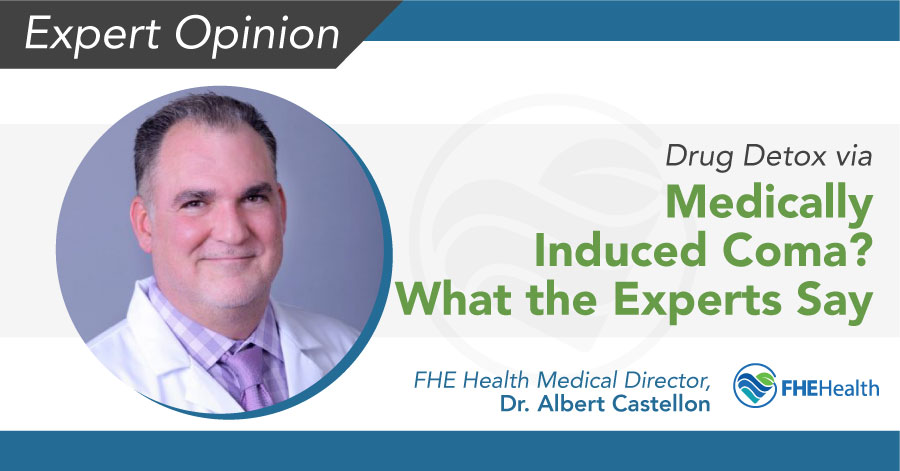
Updated October 8, 2024
University of Toronto psychologist and author Jordan Peterson, who reportedly struggled with benzodiazepine dependency, made headlines in February 2020 when he went to Russia to seek “coma detox treatment.” The procedure involved being placed in a medically induced coma that lasted for eight days, according to news reports. But the treatment is controversial— although some treatment centers claim it helps people avoid withdrawal symptoms altogether and improves their prospects of recovery.
The full truth about coma-induced detox isn’t so convenient. Just ask Dr. Albert Castellon, MD. He supervises the drug and alcohol detox process for patients at FHE Health and is well-versed in best practices for medically supervised withdrawal. In a recent interview, Dr. Castellon shared his expertise as it relates to the safety and efficacy of medically induced coma detox….
What Is a Coma or Comatose State?
First, what is a coma, and what happens in a “comatose” state? When a person is in a coma or comatose, they are in a deep, prolonged state of unconsciousness marked by unresponsiveness. Signs and symptoms can include:
- Closed eyes
- No responses to stimuli apart from reflex movements
- Depressed brainstem reflexes such as pupils not responding to light
- Irregular breathing
Comas can have multiple causes. They can be drug-induced— if a person overdoses on therapeutic or recreational medications, for example. A coma can result from “the direct toxic effect of drugs on the brain or indirect effect due to disturbances of other systems,” an article in the journal Neurology MedLink explained.
If a person is in a coma because of drugs or alcohol or other non-medical causes, they need emergency medical treatment. They may also need immediate treatment for a substance abuse and/or mental health problem. When overdose deaths in the U.S. are at an all-time high and constitute a devastating public health crisis in this country, a drug-induced, comatose state should be an automatic warning that it’s time to get help.
What Is a Coma-Induced Detox?
Medical induction is another cause of comas. Typically, when doctors induce a coma, it’s as a last resort in very serious, life-threatening situations. Say, for example, a patient has sustained a traumatic brain injury in an accident. Doctors may place them in a medically induced coma in an effort to protect the brain from further swelling or hemorrhaging.
A coma-induced detox, on the other hand, takes place in a different medical context: When an addicted person is about to begin drug or alcohol withdrawal.
“A medically induced coma for the purpose of detox is otherwise known as ‘rapid detox.’ Dr. Castellon said. “This is when a patient is under general anesthesia for several hours while they are given the opiate receptor blocker naltrexone.”
Why send the patient into a comatose state? “To have the patient go through rapid withdrawals while under anesthesia, thereby not feeling symptoms [of withdrawal],” according to Dr. Castellon. “That is the theory anyway.”
The Dangers of a Medically Induced Drug or Alcohol Detox
Of course, there are reasons that mainstream medicine views medically induced comas as a last resort rather than a preferred first option. The dangers and potential complications of this risky procedure for the purpose of a “rapid detox” far outweigh the potential benefits. Dr. Castellon summed these risks up as follows:
While under anesthesia, you are at risk of any complication that can happen during general anesthesia. These may include nausea, vomiting, teeth damage, reaction to medication, cardiovascular collapse as well as respiratory depression. Even death may occur.
What Else Makes “Rapid Detox” a Risky Gamble?
Maybe the biggest appeal of detoxing via a coma—and an advertising pitch by some rehab centers—is the claim that the patient will not have to face withdrawal symptoms. Such claims can be misleading and dangerous. Dr. Castellon pointed out that even if a patient has officially detoxed while in a coma, they may still experience withdrawal symptoms after the fact.
Dr. Castellon also acknowledged that while a pain-free withdrawal “may sound appealing at first … there are too many possibilities for complications, as well as increased likelihood of relapse.”
How a “Painless” Detox May Increase Relapse Risks
While a totally painless detox is rarely attainable, many people have found relief for physical and emotional cravings and withdrawal symptoms thanks to a medically supervised detox at a quality treatment center. Through comfort medications and medication-assisted treatments (MATs) that decrease cravings, as well as therapies that address the mental and emotional roots of a dependency or addiction, many people have been able to successfully move through withdrawal and go on to achieve long-term recovery.
On the flip side, after a medically induced coma there can still be “signs and symptoms of withdrawal such as nausea, vomiting, severe cravings, and pain,” according to Dr. Castellon, who noted that “these symptoms increase the likelihood that the patient will relapse.” In this sense, a medically induced coma detox may hurt your prospects of recovery (which of course should be the ultimate aim of any detox method).
“The purpose of a rapid detox is just that— to have the patient detoxed,” Dr. Castellon said. “The problem is that with addiction disorders there needs to be a comprehensive plan to decrease the likelihood of relapse.”
Dr. Castellon explained that a “comprehensive plan” for treating addiction is more than just about detox withdrawal symptoms. That plan is “a biomedical plan, a psychosocial plan, a mental health plan, and a support plan, as well as a continuity of care plan.”
Nobody wants to experience painful or unpleasant withdrawal symptoms, but an extreme measure like medically induced coma is a dangerous quick fix/avoidance strategy. The good news is detox doesn’t have to be as scary or painful as some might think. At a quality treatment center like FHE, there are safe, effective treatments to help you successfully detox as safely and comfortably as possible.






